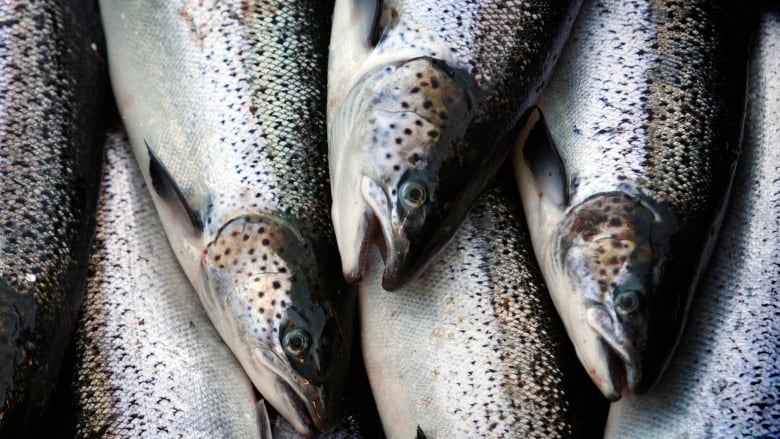Maker of GMO salmon says it sold 4.5 tonnes in Canada this year but won't say to whom
AquaBounty CEO tells investors Canadian buyer is using engineered salmon for 'high-end sashimi line'

Prepared sashimi products are where you're likely to find genetically modified salmon in Canada, the CEO of AquaBounty Technologies, a Massachusetts-based biotechnology company that produces the fish, told investors Thursday.
Ron Stotish wouldn't say exactly who is buying the company's product but did tell a group of investors meeting in New York that it has sold 4.5 tonnes of it in Canada so far this year.
This is on top of the roughly nine tonnes that were sold last year.
There is no requirement in Canada for the fish to be labelled as genetically engineered, so unless the company does it voluntarily there is no way for customers to tell the difference between non-GMO salmon and AquaBounty's product.
"The people who bought our fish were very happy with it," Stotish told the investors. "They put it in their high-end sashimi lines, not their frozen prepared foods."
Salmon was 1st genetically engineered animal approved as food
To date, AquaBounty is the only company in the world producing genetically engineered Atlantic salmon. Its product, which was originally developed at Memorial University in St. John's, was the first genetically engineered animal approved for sale as food in Canada in May 2016.
The salmon, patented under the name AquaAdvantage Salmon, is engineered to grow at twice the rate of regular salmon, using 20 to 25 per cent less feed than farmed salmon.

Genetically modified food products are not required to be labelled as such in Canada, but some advocates say it's high time they were.
"This is an untenable situation," said Lucy Sharratt of the Canadian Biotechnology Action Network.
"The fact that, once again, the company has let slip a piece of information to investors — but is information Canadian consumers need and don't have — exposes how much it is that Canadians need labelling."
A 2017 Angus-Reid survey suggested that 83 per cent of Canadians believe some genetically modified food products "should be subject to mandatory labelling in grocery stores, though the consensus is somewhat less clear on which types of GMOs ought to be subject to the rules."
Fish is grown in Panama — from Canadian eggs
AquaBounty salmon begins life in Prince Edward Island. A growth hormone gene from a chinook salmon and another one from an ocean pout are spliced into the genes of an Atlantic salmon.
The eggs are shipped to a land-based facility in Panama, where the fish grow in tanks.
AquaBounty is hoping to eventually grow the fish in North America. It has a facility in Indiana, but the U.S. Food and Drug Administration is currently blocking the importation of the salmon eggs from Canada, even though the FDA has approved AquaBounty salmon for sale in the United States.

"The company has indicated that it is fully prepared to comply with labelling requirements for its product in order for this process to conclude in the near term," AquaBounty said in an SEC filing in June.
Speaking to investors on Thursday, Stotish seemed to suggest the delay is more political than procedural. He singled out U.S. Senator Lisa Murkowski, of Alaska, who introduced the amendment prohibiting the import of the eggs needed to produce AquaBounty's salmon as well as co-sponsoring legislation mandating the labelling of genetically engineered salmon.
"She's concerned that we might compete with Alaskan salmon," said Stotish. "Her opposition gets her votes in Alaska."
Stotish suggested we can expect even more genetically modified salmon in the food supply in the future, though.
He told the investor conference that AquaBounty's Canadian buyer told him: "We'll take as much as you can produce."
AquaBounty had not returned calls from CBC News at the time of publishing.
Watch The National's 2013 report on the development of AquaBounty's genetically engineered salmon:
Corrections
- A previous version of this story mistakenly referred to the Canadian Biotechnology Action Network as the Canadian Biodiversity Action Network.Sep 07, 2018 2:50 PM ET

